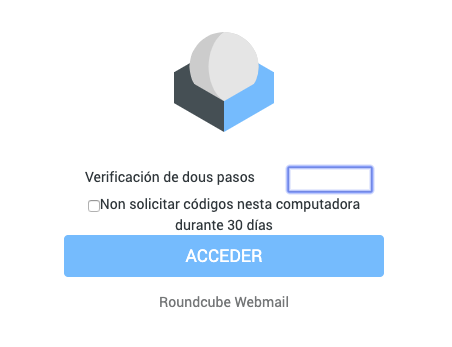This RoundCube plugin adds the 2-step verification (OTP) to the login proccess.
It works with all TOTP applications RFC 6238.
Some code by:
- Ricardo Signes
- Justin Buchanan
- Ricardo Iván Vieitez Parra
- GoogleAuthenticator class by Michael Kliewe (to see secrets)
- qrcode.js by ShimSangmin
- Also thx to Victor R. Rodriguez Dominguez for some ideas and support
-
Clone from GitHub inside the plugins directory of Roundcube:
cd pluginsgit clone https://github.com/alexandregz/twofactor_gauthenticator.git
-
Or use composer from the Roundcube root directory:
composer require alexandregz/twofactor_gauthenticator:dev-master
NOTE: Answer N when composer ask you about plugin activation.
-
Activate the plugin by editing the
HOME_RC/config/config.inc.phpfile:$config['plugins'] = [ // Other plugins... 'twofactor_gauthenticator', ];
Copy HOME_RC/plugins/twofactor_gauthenticator/config.inc.php.dist to HOME_RC/plugins/twofactor_gauthenticator/config.inc.php.
Configure or remove at least the config value "users_allowed_2FA" from config.inc.php and configure other config values to your needs.
NOTE: plugin must be base32 valid characters ([A-Z][2-7]), see https://github.com/alexandregz/twofactor_gauthenticator/blob/master/PHPGangsta/GoogleAuthenticator.php#L18
From #139
The first time you open the app you see the default settings:
The most easy way to configure the app is by clicking "Fill all fields". The plugin automatically creates the secret for you:
Now scan the QR code with any authenticator app, generate a code, enter your new code in the bottom field and press "Check code". If your code is a match, you can press "Save" to save the configuration.
Alternatively, you can configure the app manually by checking the checkbox and pressing "Save". A secret will be automatically generated:
Now you can press "Show QR code" or use the generated secret to connect to any authenticator app.
Also, you can add "Recovery codes" for use one time (they are deleted when used). Recovery codes are OPTIONAL, so they can be left blank.
If config value force_enrollment_users is true, ALL users needs to login with 2-step method. They receive alert message about that, and they can't skip without save configuration
If config value 2step_codes_on_login_form is true, 2-step codes (and recovery) must be sended with password value, append to this, from the login screen: "Normal" codes just following password (passswordCODE), recovery codes after two pipes (passsword||RECOVERYCODE)
Actually only into samefield branch
Codes have a 2*30 seconds clock tolerance, like by default with Google app (Maybe editable in future versions)
Install PHP-CS-Fixer (requires composer to be installed):
composer install --working-dir=./tools/php-cs-fixerRun the coding standards fixer (in current working directory):
./tools/php-cs-fixer/vendor/bin/php-cs-fixer fix .MIT, see License
Tested with RoundCube 0.9.5 and Google app. Also with Roundcube 1.0.4 and 1.6.9 with OpenAuthenticator.
Remember, sync time it's essential for TOTP: "For this to work, the clocks of the user's device and the server need to be roughly synchronized (the server will typically accept one-time passwords generated from timestamps that differ by ±1 from the client's timestamp)" (from http://en.wikipedia.org/wiki/Time-based_One-time_Password_Algorithm)
Alexandre Espinosa Menor aemenor@gmail.com
Open issues using github, don't send me emails about that, please -usually Gmail marks messages like SPAM
- Vagrant: https://github.com/alexandregz/vagrant-twofactor_gauthenticator
- Docker: https://hub.docker.com/r/alexandregz/twofactor_gauthenticator/
Add a symlink into the public_html/assets directory
Show explained #29 (comment) by https://github.com/d7415
You can use various OTP clients -link by https://github.com/helmo
Suggested by simon@magrin.com
To log errors with bad codes, change the $_enable_logs variable to true.
The logs are stored to the file HOME_RC/logs/log_errors_2FA.txt -directory must be created
You can define whitelist IPs into config file (see config.inc.php.dist) to automatic login -the plugin don't ask you for code
To deactivate the plugin, you can use two methods:
-
To only one user: restore the user prefs from DB to null (rouncubeDB.users.preferences) -the user plugin options stored there.
-
To all: remove the plugin from config.inc.php/remove the plugin itself
-
Use config.inc.php file (see config.inc.php.dist example file)
-
Modify array users_allowed_2FA with users that you want to use plugin. NOTE: you can use regular expressions
Use 1.3.9-version branch
$ git checkout 1.3.9-version
If you download 1.4.x RC version (with elastic skin), use master version normally (thx to tborgans)
Reported by kototilt@haiiro.dev (thx for the report and the PoC script)
I made a little modification on script to not allow to save config without param session generated from a rendered page, to force user to introduce previously 2FA code and navigate across site.
NOTE: Also I check if user have 2FA activated because with only first condition -check SESSION- app kick out me before to activate 2FA.
On function twofactor_gauthenticator_save() I added this code:
// save config
function twofactor_gauthenticator_save()
{
$rcmail = rcmail::get_instance();
// 2022-04-03: Corrected security incidente reported by kototilt@haiiro.dev
// "2FA in twofactor_gauthenticator can be bypassed allowing an attacker to disable 2FA or change the TOTP secret."
//
// Solution: if user don't have session created by any rendered page, we kick out
$config_2FA = self::__get2FAconfig();
if(!$_SESSION['twofactor_gauthenticator_2FA_login'] && $config_2FA['activate']) {
$this->__exitSession();
}The idea is to create a session variable from a rendered page, redirected from __goingRoundcubeTask function (redirector to roundcube tasks)
Previously, with security compromised:
alex@vosjod:~/Desktop/report$ ./poc.py
Password:xxxxxxxx
1. Fetching login page (http://localhost:8888/roundcubemail-1.4.8)
2. Logging in
POST http://localhost:8888/roundcubemail-1.4.8/?_task=login
3. Disabling 2FA
POST http://localhost:8888/roundcubemail-1.4.8/?_task=settings&_action=plugin.twofactor_gauthenticator-save
POST returned task "settings"
2FA disabled!Modified code and tested again, not allowed to deactivated/modified without going to a RC task (with 2FA authentication):
alex@vosjod:~/Desktop/report$ ./poc.py
Password:xxxxxxxxx
1. Fetching login page (http://localhost:8888/roundcubemail-1.4.8)
2. Logging in
POST http://localhost:8888/roundcubemail-1.4.8/?_task=login
3. Disabling 2FA
POST http://localhost:8888/roundcubemail-1.4.8/?_task=settings&_action=plugin.twofactor_gauthenticator-save
POST returned task "login"
Expected "settings" task, something went wrongYou can use docker-compose file to modify and test plugin:
- Replace
mail.EXAMPLE.comfor your IMAP and SMTP server. docker-compose up- You can use
adminerto check DB and reset secrets, for example.







